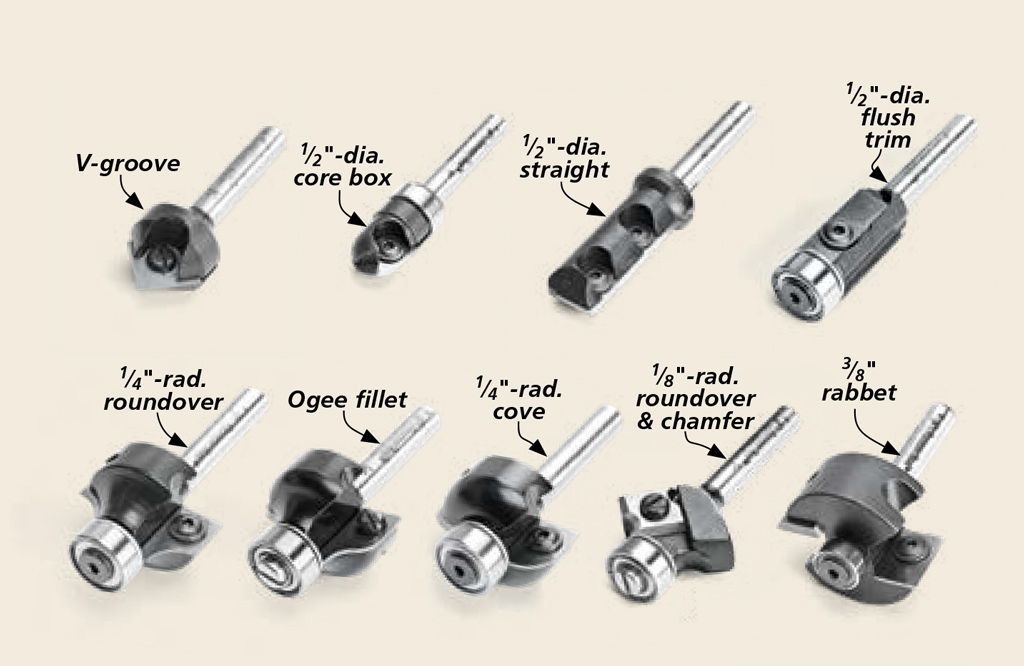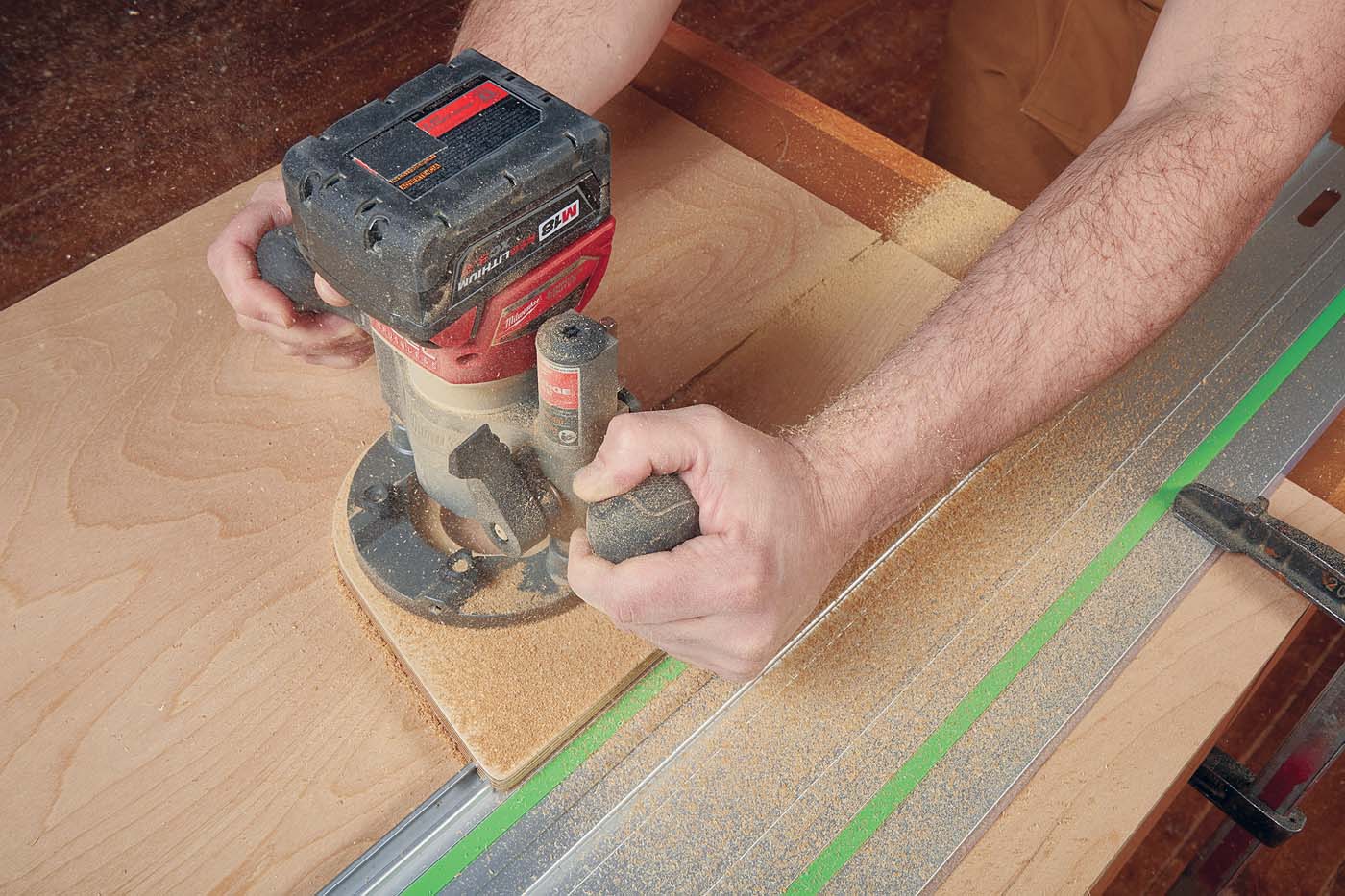
There aren't many projects in my shop that don't get some treatment from a router. Whether it's adding an edge profile or cutting a mortise, the router is a go-to tool.
The problem is router bits have a limited lifespan. Don't get me wrong, modern, tungsten-carbide edges hold up pretty well. But when they start to dull, you need to sharpen or replace them. And both options have a downside.
Replacing bits gets expensive. But sharpening carbide is difficult and can change the diameter as the carbide is honed. This isn't as big a concern for certain profile bits (like an ogee). But for a flush-trim bit it can mean the bit and bearing are no longer the exact same size and the quality of the cut will be affected.
The new In-Tech line of router bits from Amana solves the problem by making the individual carbide cutters on the bit removable. So when the edge is dull, you simply turn the cutter to a fresh edge or replace it with a new, inexpensive insert.

GOOD SELECTION. A quick scan of the bits in the photo above shows that Amana chose nine of the most commonly used profiles for woodworkers. These are the workhorses of most home shops. So the cost savings is significant when averaged over the life of these new bits.
__A NOT-SO-NEW IDEA. __ This isn't a new concept in router bit design, however. Amana has produced replaceable insert bits for CNC (computer numerically controlled) industrial machines for many years. These designs have proven themselves in production environments. But bringing this technology to the home woodworker might change the way you think about router bits.
HOW THEY WORK. To make changing cutters possible, the carbide inserts are held in place with a screw. (I really appreciated Amana including the proper size hex wrench with each bit.)
At first I was a little nervous about a single screw holding the cutter of a bit moving at 20,000 RPM, but I never found it to be a problem. Aligning the cutter in the bit is made easy by the design of the body - you'd have a hard time installing them incorrectly.

PERFORMANCE. I was curious to see how well these bits perform in normal workshop use, so I gave them a pretty good workout on different materials. I started with the rabbet bit and cut deep rabbets in white oak, plywood, and MDF.
I purposely removed more material than I normally would in a single pass to put some strain on the bits. You can see the results in the photos. The cuts were smooth in each of the different materials. I continued the test alternating between plywood, MDF, and oak and ended up routing over 100 linear feet without seeing any degradation in performance.
In fact, I routed just about everything I could get my hands on for a couple of days (including melamine-covered particle board, a notorious bit killer). But the bits showed no sign of slowing down or losing their edge.
On one occasion, however, I did manage to break a cutter. While using a flush-trim bit to level some glued-on edging, the cutter shattered. A glob of dried glue squeezeout was to blame. And it turns out the carbide used in these bits has something to do with it.

SUB-MICRO GRADE CARBIDE. The unique thing about these bits is that they're made of a harder grade of tungsten carbide than conventional bits. This "sub-micro grade" carbide can't be brazed onto the body of a bit. So these bits are the perfect application for the harder metal. However, the hardness of the carbide also means that the inserts tend to be a little more brittle.
THE PRICE. The most surprising thing about the In-Tech bits is the price. Overall, they're comparable to other high-quality bits. For example, the straight plunge bit runs about $17 and a new insert is $4. The price for both bits and inserts goes up as the complexity of the bit's profile increases. The ogee fillet, for instance, is $52 and $16 for the pair of replacement cutters.
BOTTOM LINE. As I said earlier, this technology has been used on CNC router bits for years. So it should be no surprise that the bits performed well in the workshop.
In spite of their unconventional appearance, the In-Tech bits ran smooth and were free of vibration. The cutting performance consistently matched or exceeded what you'd expect from a high-quality conventional bit.
Coupling their performance with the low cost of replacing the insert cutters instead of buying new bits, they're sure to be a welcome addition to any shop.
Stepping Up: Heavy-Duty Bits

After looking over Amana's new In-Tech bits, you might wonder why they didn't include 1/2" shanks in the lineup. As it happens, they're already available and in greater numbers than the In-Tech line. Dozens of common profiles are in use every day in industrial applications.
The problem is, they're often priced beyond the reach of most woodworkers. For example, the 1/2 " shank rabbet bit retails for $110. The smaller In-Tech bit below it is only $29. Of course there are advantages beyond just the shank size with the more expensive bit. The carbide inserts are available in different grades, allowing you to tailor the cutter to the specific type of material.












